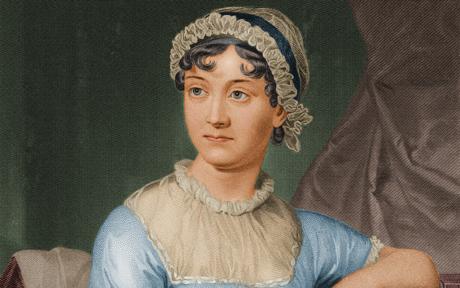Jane Austen's famous prose may not be hers after all
Yet Jane Austen couldn't spell, had no grasp of punctuation and her writing betrayed an accent straight out of The Archers, according to an Oxford University academic.
Prof Kathryn Sutherland said analysis of Austen's handwritten letters and manuscripts reveal that her finished novels owed as much to the intervention of her editor as to the genius of the author.
Page after page was written without paragraphs, including the sparkling dialogue for which Austen is known. The manuscript for Persuasion, the only one of her novels to survive in its unedited form, looks very different from the finished product.
"The reputation of no other English novelist rests so firmly on the issue of style, on the poise and emphasis of sentence and phrase, captured in precisely weighed punctuation. But in reading the manuscripts it quickly becomes clear that this delicate precision is missing.
"This suggests somebody else was heavily involved in the editing process between manuscript and printed book," Prof Sutherland said.
The editor in question is believed to have been William Gifford, a poet and critic who worked for Austen's second publisher, John Murray.
"Gifford was a classical scholar known for being quite a pedant. He took Austen's English and turned it into something different - an almost Johnsonian, formal style," Prof Sutherland said.
"Austen broke many of the rules for writing 'good' English. Her words were jumbled together and there was a level of eccentricity in her spelling - what we would call wrong.
"She has this reputation for clear and elegant English but her writing was actually more interesting than that. She was a more experimental writer than we give her credit for. Her exchanges between characters don't separate out one speaker from another, but that can heighten the drama of a scene.
"It was closer to the style of Virginia Woolf. She was very much ahead of her time."
Amongst Austen's grammatical misdemeanours was an inability to master the 'i before e' rule. Her manuscripts are littered with distant 'veiws' and characters who 'recieve' guests.
Elsewhere, she wrote "tomatoes" as "tomatas" and "arraroot" for "arrowroot" - peculiarities of spelling that reflect Austen's regional accent, Prof Sutherland explained. "In some of her writing, her Hampshire accent is very strong. She had an Archers-like voice with a definite Hampshire burr."
Over 1,000 of these handwritten pages will be placed online from Monday as the culmination of a three-year project led by Prof Sutherland in collaboration with the Bodleian Libraries, King's College London and the British Library. The collection reunites the letters and manuscripts for the first time since 1845, when they were scattered by the terms of her sister Cassandra's will.
They range from fiction written in early childhood to the manuscript for Sanditon, the novel that Austen was writing when she died in 1817. Sadly, the manuscripts for Pride and Prejudice, Sense and Sensibility and Emma, her most famous novels, were destroyed after being set in print.
--By Anita Singh,22 Oct 2010
- PEP人教版小学英语三至六年级录音(含每页听力文本和单词表)
- 〖人教版PEP小学英语三至六年级英语教材的mp3〗
- 2013年新版外研社新标准小学三年级上册英语全册课文录音下载
- 人教版新目标英语九年级全册录音(含听力文本+翻译+单词表)
- 人教版新目标英语七年级上册录音(含听力文本+翻译+单词表)
- PEP新版四年级下册英语电子课本(附音频mp3)
- PEP六年级下册英语电子课本和课文录音下载(2015年春季新版)
- 新版外研社八年级下册英语电子课本和录音下载目录
- 最新版PEP五年级下册英语电子课本和课文录音下载(2015年春季)
- 2016年全国各地高考英语真题和听力下载目录
- 新版外研社新标准四年级下册英语电子课本和录音下载
